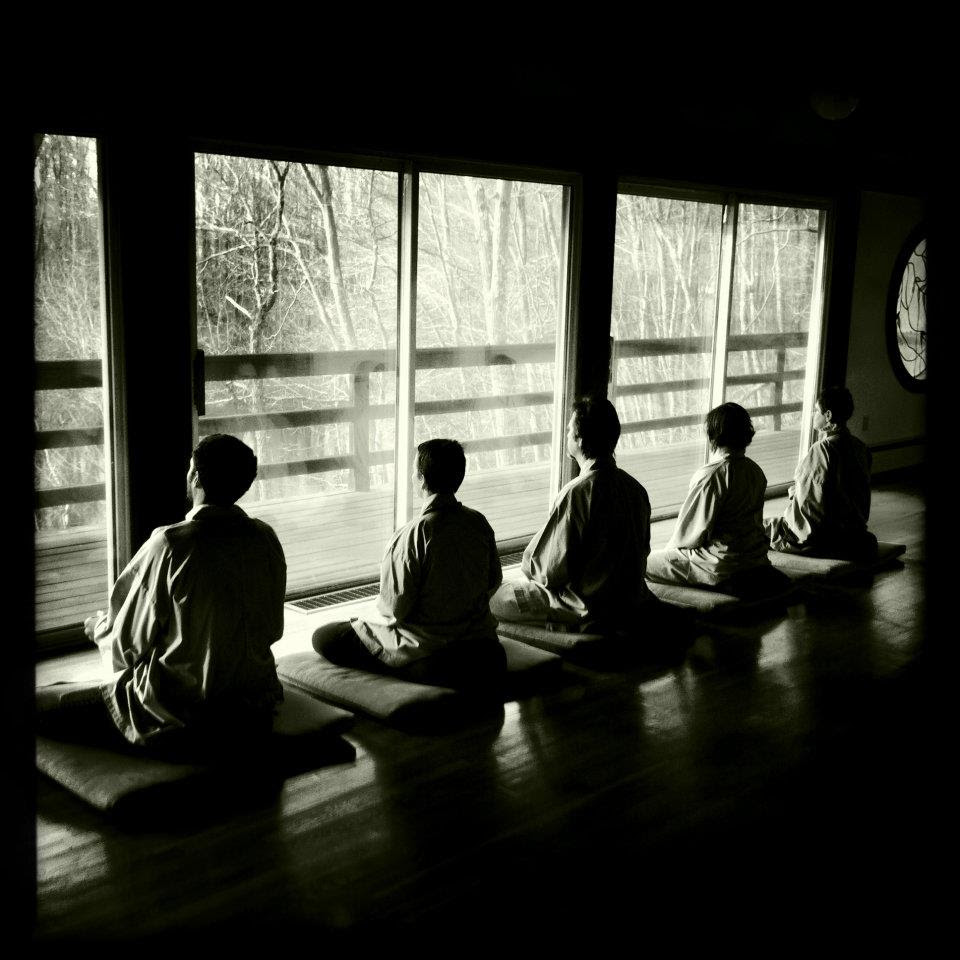-
0:00/5:32
-
0:00/7:20
Fifteen-Minute Practice
Almost everyone struggles to incorporate meditation practice into the flow of daily life. We say, “I’d like to practice, but can’t find the time,” and then we go about our daily affairs.
 Some people have unrealistic expectations, thinking that if they don’t practice an hour every day, then perhaps they shouldn't practice at all. An hour is a lot of time, but almost everyone can find fifteen minutes for daily practice. And that’s enough.
Some people have unrealistic expectations, thinking that if they don’t practice an hour every day, then perhaps they shouldn't practice at all. An hour is a lot of time, but almost everyone can find fifteen minutes for daily practice. And that’s enough.
This page describes a complete, fifteen-minute Zen practice, one that includes each of the five major elements of practice; these are:
Four Great Vows. These ancient vows confirm our direction to awaken and help all beings.
Bowing. Prostrations balance the scales of our accumulated karma.
Chanting. Chanting opens the heart of our natural compassion.
Sitting. Sitting meditation develops resiliency and stability in daily life.
Reading. Reading Zen teachings sharpens cognition so that we can function correctly.
You can do this simple, fifteen-minute practice every day. Most people find it easiest to practice first thing in the morning. Set your alarm clock twenty minutes earlier than usual. Get up, stretch, and loosen your body for a few minutes, then begin practice. Repeat the next day!
Four Great Vows (30 seconds)
Sentient beings are numberless; we vow to save them all.
Delusions are endless; we vow to cut through them all.
The teachings are infinite; we vow to learn them all.
The Buddha Way is inconceivable; we vow to attain it.
Bowing (1 minute)
Start with one standing bow. With hands placed palms together at chest height (hapchang), lower your upper body and head and then return to standing position with hands still together. Then do nine full bows. With hands together, bend knees, lowering body, until sitting on heels. Then go forward to hands and knees, touching head to floor. You can use your hands to support your body as you go down. Then lift head, rock forward on hands and knees, and return to standing. During the last (ninth) bow, when head is still on the floor, rise to a sitting position and the hands together, then return head back to the floor. Then stand. Finish with a standing bow.
Chanting (5 minutes)
Sit on your mat or cushion and chant the Heart Sutra (see below)
Sitting Meditation (10 minutes)
Sit quietly for 10 minutes
Reading (3 minutes)
Read a short passage from Dropping Ashes on the Buddha, Compass of Zen or another book of Zen teaching.

HEART SUTRA
Avalokitesvara Bodhisattva
when practicing deeply the Prajna Paramita
perceives that all five skandhas are empty
and is saved from all suffering and distress.
Shariputra,
form does not differ from emptiness,
emptiness does not differ from form.
That which is form is emptiness,
that which is emptiness form.
The same is true of feelings,
perceptions, impulses, consciousness.
Shariputra,
all dharmas are marked with emptiness;
they do not appear or disappear,
are not tainted or pure,
do not increase or decrease.
Therefore, in emptiness no form, no feelings,
perceptions, impulses, consciousness.
No eyes, no ears, no nose, no tongue, no body, no mind;
no color, no sound, no smell, no taste, no touch,
no object of mind;
no realm of eyes
and so forth until no realm of mind consciousness.
No ignorance and also no extinction of it,
and so forth until no old age and death
and also no extinction of them.
No suffering, no origination,
no stopping, no path, no cognition,
also no attainment with nothing to attain.
The Bodhisattva depends on Prajna Paramita
and the mind is no hindrance;
without any hindrance no fears exist.
Far apart from every perverted view one dwells in Nirvana. In the three worlds
all Buddhas depend on Prajna Paramita
and attain Anuttara Samyak Sambodhi.
Therefore know that Prajna Paramita
is the great transcendent mantra,
is the great bright mantra,
is the utmost mantra,
is the supreme mantra
which is able to relieve all suffering
and is true, not false.
So proclaim the Prajna Paramita mantra,
proclaim the mantra which says:
gate gate paragate parasamgate bodhi svaha
gate gate paragate parasamgate bodhi svaha
gate gate paragate parasamgate bodhi svaha.
The Kwan Um School of Zen website has audio files of this chant that can help you learn the rhythm.
 Some people have unrealistic expectations, thinking that if they don’t practice an hour every day, then perhaps they shouldn't practice at all. An hour is a lot of time, but almost everyone can find fifteen minutes for daily practice. And that’s enough.
Some people have unrealistic expectations, thinking that if they don’t practice an hour every day, then perhaps they shouldn't practice at all. An hour is a lot of time, but almost everyone can find fifteen minutes for daily practice. And that’s enough. This page describes a complete, fifteen-minute Zen practice, one that includes each of the five major elements of practice; these are:
Four Great Vows. These ancient vows confirm our direction to awaken and help all beings.
Bowing. Prostrations balance the scales of our accumulated karma.
Chanting. Chanting opens the heart of our natural compassion.
Sitting. Sitting meditation develops resiliency and stability in daily life.
Reading. Reading Zen teachings sharpens cognition so that we can function correctly.
You can do this simple, fifteen-minute practice every day. Most people find it easiest to practice first thing in the morning. Set your alarm clock twenty minutes earlier than usual. Get up, stretch, and loosen your body for a few minutes, then begin practice. Repeat the next day!
Four Great Vows (30 seconds)
Sentient beings are numberless; we vow to save them all.
Delusions are endless; we vow to cut through them all.
The teachings are infinite; we vow to learn them all.
The Buddha Way is inconceivable; we vow to attain it.
Bowing (1 minute)
Start with one standing bow. With hands placed palms together at chest height (hapchang), lower your upper body and head and then return to standing position with hands still together. Then do nine full bows. With hands together, bend knees, lowering body, until sitting on heels. Then go forward to hands and knees, touching head to floor. You can use your hands to support your body as you go down. Then lift head, rock forward on hands and knees, and return to standing. During the last (ninth) bow, when head is still on the floor, rise to a sitting position and the hands together, then return head back to the floor. Then stand. Finish with a standing bow.
Chanting (5 minutes)
Sit on your mat or cushion and chant the Heart Sutra (see below)
Sitting Meditation (10 minutes)
Sit quietly for 10 minutes
Reading (3 minutes)
Read a short passage from Dropping Ashes on the Buddha, Compass of Zen or another book of Zen teaching.

HEART SUTRA
Avalokitesvara Bodhisattva
when practicing deeply the Prajna Paramita
perceives that all five skandhas are empty
and is saved from all suffering and distress.
Shariputra,
form does not differ from emptiness,
emptiness does not differ from form.
That which is form is emptiness,
that which is emptiness form.
The same is true of feelings,
perceptions, impulses, consciousness.
Shariputra,
all dharmas are marked with emptiness;
they do not appear or disappear,
are not tainted or pure,
do not increase or decrease.
Therefore, in emptiness no form, no feelings,
perceptions, impulses, consciousness.
No eyes, no ears, no nose, no tongue, no body, no mind;
no color, no sound, no smell, no taste, no touch,
no object of mind;
no realm of eyes
and so forth until no realm of mind consciousness.
No ignorance and also no extinction of it,
and so forth until no old age and death
and also no extinction of them.
No suffering, no origination,
no stopping, no path, no cognition,
also no attainment with nothing to attain.
The Bodhisattva depends on Prajna Paramita
and the mind is no hindrance;
without any hindrance no fears exist.
Far apart from every perverted view one dwells in Nirvana. In the three worlds
all Buddhas depend on Prajna Paramita
and attain Anuttara Samyak Sambodhi.
Therefore know that Prajna Paramita
is the great transcendent mantra,
is the great bright mantra,
is the utmost mantra,
is the supreme mantra
which is able to relieve all suffering
and is true, not false.
So proclaim the Prajna Paramita mantra,
proclaim the mantra which says:
gate gate paragate parasamgate bodhi svaha
gate gate paragate parasamgate bodhi svaha
gate gate paragate parasamgate bodhi svaha.
The Kwan Um School of Zen website has audio files of this chant that can help you learn the rhythm.
Keep Up With What is Happening at DVZC
Practice Schedule
Practice is held every Wednesday evening at the New Ark United Church of Christ, 300 E. Main St, Newark, DE 19711.
Practice begins at 6:30pm with a short orientation for beginners, followed by chanting. We then have two 25 minute periods of sitting meditation with a 10 minute period of walking meditation in between.
Free Meditation Instruction sessions will be scheduled as requested. Send an email to DVZCinfo@gmail.com and ask to be added to the next instruction class.
There is no fee to attend our practice, you do not have to be a member.
Monkey Mind Zen,
is a DVZC satellite.
The group meets in Philadelphia.
For information about their practice visit:


